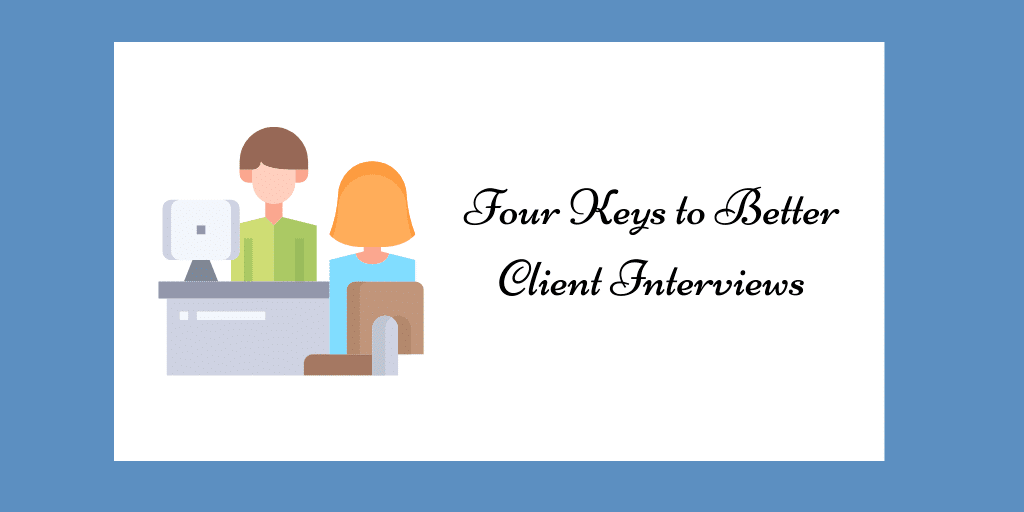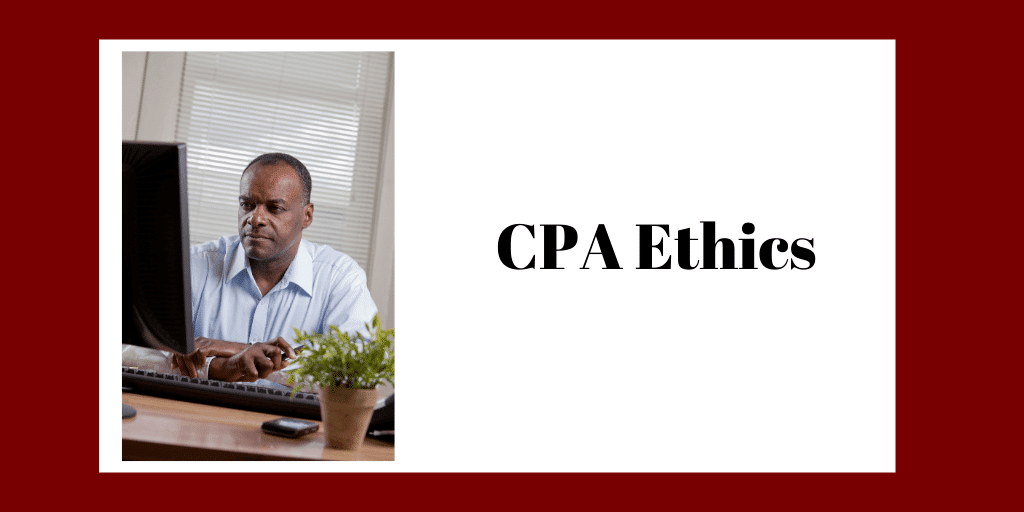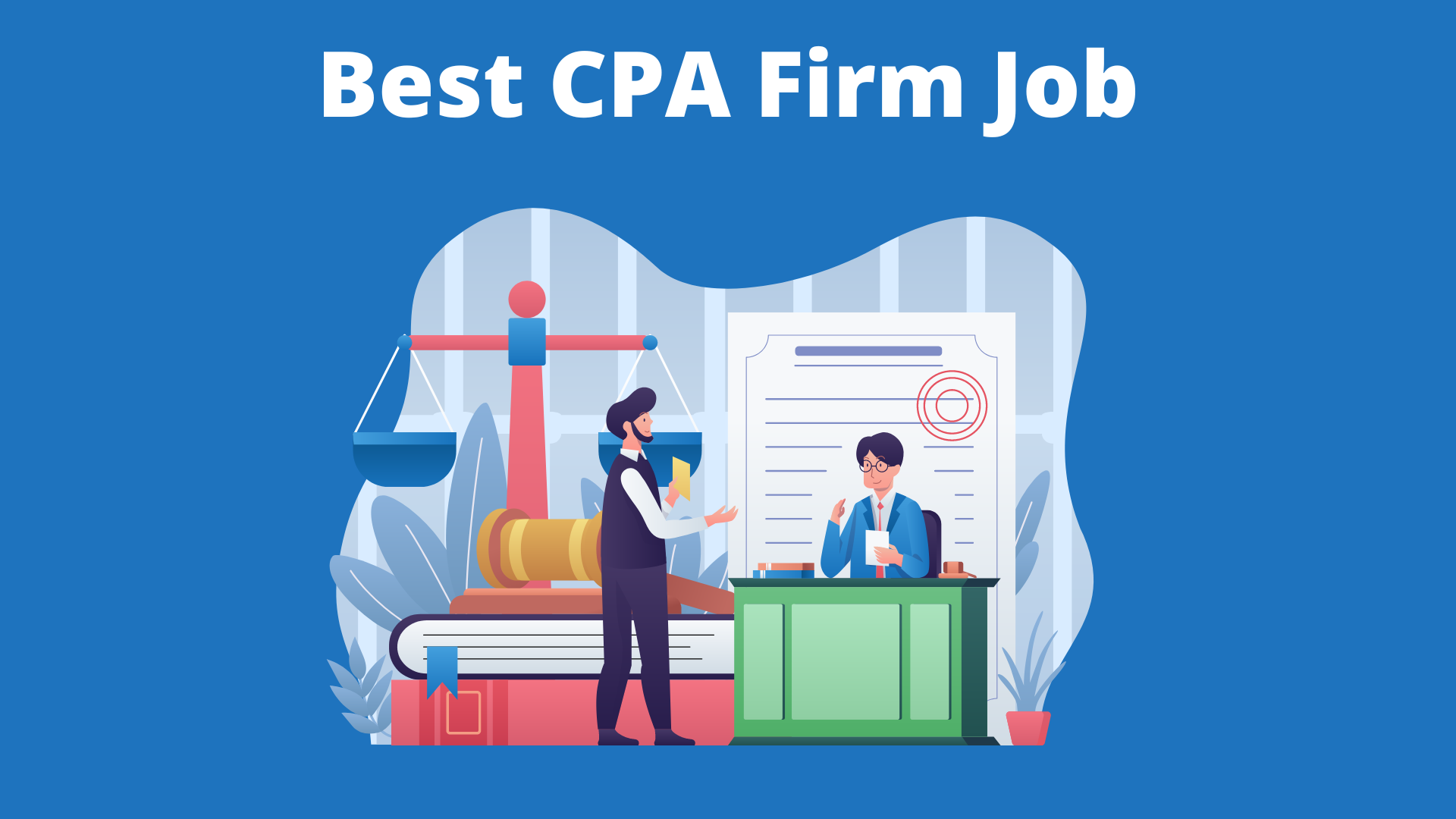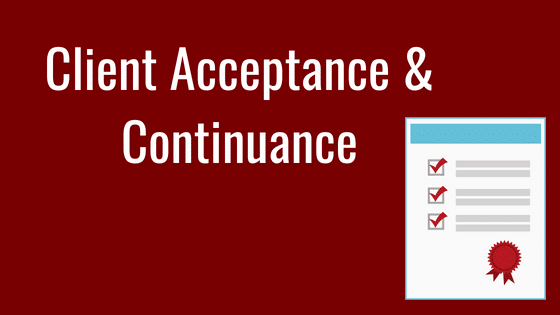CPA Client Interviews: Four Keys

Today we talk about four keys to better CPA client interviews.
Many times I have interviewed accounting staff and walked away thinking, “I have no idea what they just said to me.” Do you ever have this problem? If yes, this article is for you. Below I provide four keys to better client interviews.
In my early years–fresh out of college–I would think: “I must be stupid. It’s obvious, he understands what he just said, but I don’t.” Often my anxiety would increase when I realized the interviewee (e.g, accounts payable clerk) had no college degree (and me, a masters in accounting).
Reasons We Don’t Understand
After years of performing client interviews, I realized that I wasn’t dense (at least, not as much as I thought), and that I was encountering what The Art of Explanation calls, the “curse of knowledge.”
What is the “curse of knowledge?” It’s when someone knows a subject very well, and, consequently, has a difficult time imagining what it is like to not know it. I was experiencing the “curse of knowledge.” Those I interviewed thought I knew what they knew. As a result, they left out details.
Also, those I interviewed had years of experience doing the same job day after day. Of course they understood what they did. But I had less than an hour, in many cases, to grasp their duties.
Additionally, those I interviewed used a language unique to their office, and I, mistakenly, tried to use a different language—one I had learned in college. The result: we did not understand one another. So how can I communicate and comprehend better?
Here are four CPA client interview ideas guaranteed to to help.
Four Keys to CPA Client Interviews
1. Pay attention to their language and use it.
If they call it a thingy, then I call it a thingy.
2. Seek understanding more than trying to impress.
I often want to impress more than I desire to understand. The remedy: Admit (maybe even out loud) I don’t know everything.
I tell the clerk, “Treat me like I don’t know anything. I’ve never been here, so I need your help in understanding what you do.”
To higher level personnel (e.g., CFO), I might say, “I have worked in this industry for fifteen years, but I need your help to understand how you guys operate.”
3. Repeat what is said to you.
For example, “May I repeat what you just said to make sure I understand? ‘The thingy is created once per week on Mondays to ensure that total receipts agree with deposits.’”
4. Use your cell phone to take pictures and to record parts of the interview.
Just last week, I reviewed a complex accounting system (for about three hours). As I did so, I used my cell phone Evernote app to take pictures of computer screens and printed reports. I also used the app to record parts of the conversation. Later, I summarized the conversation in memo form (complete with pictures).
Scanbot is another useful iPhone app if you take pictures of client information. By using your phone to take pictures, you can leave your physical scanner in your office.
Your CPA Client Interview Ideas
Have I left out any key interviewing ideas? Please share your thoughts.
Check out my series of articles about auditing.
Learn from my CPA Hall Talk newsletter!
Get my free accounting and auditing digest with the latest content.



I have played a role of an interviewee by external auditors on behalf of my clients for many years in Japan. I think that those auditors also conducted an audit with careful concerns like yours and ensured a high quality audit as you have done.
Rebecca, yes taking notes helps. Doing so forces me to be more alert–I can’t write down what I don’t understand. I too provide my summaries and maps back to the client just to confirm I have understood correctly. Thanks for your comments.
I find taking notes is essential. As I write it down I get a better handle on the clients needs. Plus if I diagram out the flow of their operations, I can confirm that with the client and make changes as necessary in my notes. Good article.
These are excellent suggestions. I try to write the related comprehensive memo ASAP. Also, sometimes I can take a short note, which is too short. Ideally this interview will be recorded.
Michael, your question may be the most important we could ask. And clients want to be heard and understood–we all do. It’s in the DNA of us all. But to understand the needs of another and then meet those needs, that’s magic. No better way to serve a client.
Charles:
One of the questions we now ask every potential client is “What keeps you up at night, where is your pain?” Then we LISTEN. So many times we have the answer before hearing the problem.
I agree John. Repeating what was said tells you whether you heard the full conversation–or not. It also solidifies your understanding; we retain that which we speak of.
For me, #3 “repeat what is said to you” works very well. I think that is because when you repeat what someone says, you repeat it back in your own words and thoughts and the client will likely correct any misunderstandings you have. Also, when you repeat it back you usually leave out the unimportant details the client has shared with you.
I used this method many times and I did find many improvement to internal control. It takes more time to analyse and to summarise.
Good point Joe. If the person is intentionally trying to be vague, then the clarification question (from the auditor) will make the purposeful miscommunication (of the interviewee) even more apparent.
Good article. When you encounter language or terms that you aren’t sure you understand, ask the question, “What do you mean when you say ‘thingy?’ Never assume you completely understand what the subject is saying.
Eddie, interesting question. I don’t think I have ever purposely used a “non-directed inquiry”, but I have had similar results from simply listening – mainly while performing walk-throughs. I do like to use very general questions at the end of my interviews such as “is there anything else of importance that you think I need to know?”
I do find that most interviewees are less than forthcoming when there is known adverse information; they are afraid of the consequences of telling the truth. This week I heard a speaker say that the new whistle blower provisions of Dodd Frank have not yielded any appreciable increase in fraud detection even though significant monetary rewards have been offered.
For internal control review, I’m guessing you would have fairly focused questions. In terms of more general planning, however, what do you think about having non-directed inquiry? It seems to me that therapists often use this approach: they get their patients to start talking on the assumption that the patient will lead them to the things that are most on their mind. It seems to me that auditors might take advantage of non-directed inquiry in the same way. Find out what the client thinks has been interesting in the last year and get them to talk about it further, without necessarily knowing if there are important accounting implications. I suspect some auditors would consider this approach to be inefficient, but it seems promising to me.